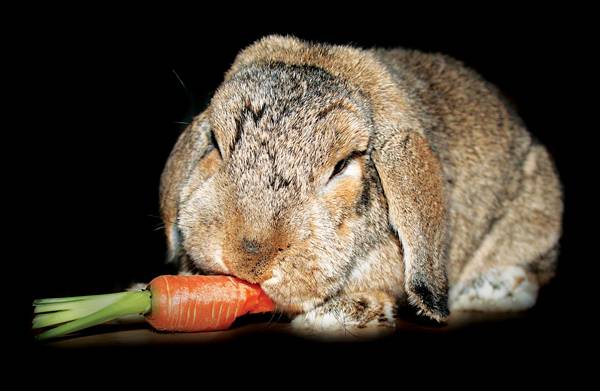PRELL: Pledge to veg

A choice to live without meat can have positive health consequences. According to research from the Center for Disease Control and Prevention, a vegetarian diet can decrease the likelihood of a stroke and cardiovascular disease. Photo Courtesy: Sxc.hu
March 29, 2009
I grew up on a farm in northwest Iowa. Plenty of animals roam those acres, from your typical cattle, sheep and equine to the somewhat more exotic spattering of bison, yak, potbelly pigs, pygmy goats and Shetland ponies.
And, as is the case with all mortal things, these animals die. One that comes to mind is Gobbles the Turkey, named after the infamous fowl from South Park. Now, my family all loved Gobbles the Turkey, but facts are facts, and the bird had croaked. So what were we to do?
Well, we did what many farmers do now and have done for centuries. We ate him.
The whole scene was very morbid. Very much like some kind of love-child of Edgar
Allen Poe and Alfred Hitchcock. Definitely Unnatural.
It isn’t right, I thought. It isn’t fair to eat a pet. Gobbles had a name! Not a very original name, but a name nonetheless! A unique tag! An identity! But alas, I munched on Gobble’s thighs anyway.
That was roughly five years ago. Now I’m an adult, fully capable of making my own decisions and impacting the world in whatever way I can. And so I come to you, with intention to set things right between myself and all the animals I’ve devoured over the years.
I’m going vegetarian. And vegan. First one, then the other. From tomorrow, April 1, to April 7, I’ll be going lacto-ovo vegetarian, meaning I won’t be processing or digesting any more animal souls, though I will be exploiting their labor. In layman’s terms, I’ll be eating plants, dairy, and eggs.
Then, from April 8 to April 15, I’ll be traveling the gravel-laden road of a true vegan:
No meat, no dairy, no eggs, no animal products of any kind.
According to Iowa State’s Vegan/Vegetarian Club, founded in 2006 by Kate Lydon, there are a multitude of reasons to “go veg,” ten of which are listed on their Web site.
They are as follows:
Because meat contains high amounts of fat and cholesterol.
Because meat is almost always contaminated with E. coli, which comes from fecal matter.
Because it significantly lowers your risk of heart disease as well as other diseases and cancers.
Because the animals you eat are often fed the remains of mad cow-infected animals.
Because pigs are more intelligent than dogs, and they can suffer too.
Because slaughterhouses send animals through the line still alive.
Because more than half of all water used in the United States goes to the meat industry.
Because chickens often go insane in the cramped spaces and have their beaks burned off.
Because the huge amount of grain used to feed animals could be used to feed starving humans.
Because more than 90 percent of the energy put into meat production does not reach us.
It’s a touching list, filled to the brim with ethos and pathos, but how much is objective fact?
Let’s take the first two for argument’s sake. Number one: Yes, it is absolutely true that meat contains higher concentrations of fat and cholesterol, so this statement may stand.
However, the ISU Vegan/Vegetarian Club’s second item is somewhat misleading. Yes, meat very often has E. Coli swimming freely within its cellular walls. However, here’s something you might not know: So do you.
E. Coli actually refers to a group of bacteria containing more than 700 serotypes — subdivisions of a species of microorganism — which mostly reside in the intestinal tracts of warm-blooded animals — e.g. you. They are by and large harmless. Their habitat also explains why saying the bacteria comes from “fecal matter,” while technically accurate, is somewhat misleading. And, call me crazy, but I get the feeling such a claim is made more to gross out meat-eaters than anything else.
So reason number two is somewhat … exaggerated.
Yet, there is indeed tangible evidence, collected by the CDC’s National Health and Nutrition Examination Survey, which suggests extremely positive benefits to such a diet. They include a 27 percent lower incidence of stroke, a 42 percent lower stroke mortality, a 27 percent lower cardiovascular disease mortality and a 15 percent lower all-cause mortality.
These results come gleefully alongside other reports which detail vegan/vegetarian diets as effective protection against cancer, diabetes and cardiovascular disease.
So is vegetarianism a fad full of ideology and hippies or a legitimate lifestyle? Quite frankly, at this point, I don’t know. But I intend to find out.
— Sophie Prell is a junior in pre-journalism and mass communication from Alta.






